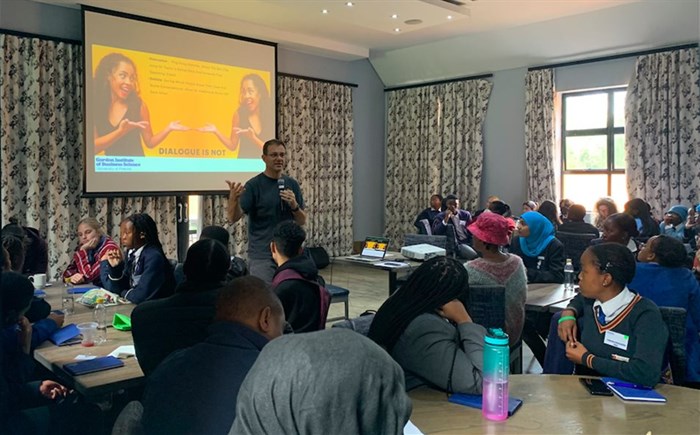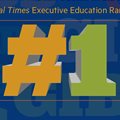Let's imagine that climate activist Greta Thunberg had been born in Soweto or Swartruggens instead of Stockholm, Sweden. Would adults in South Africa have taken her seriously at age 15, when her school strikes for climate made her world famous? And would a homegrown teenager have a voice strong enough to hold her own among global leaders at the World Economic Forum? Probably not. Or rather, not yet.
Devastatingly, most young South Africans are not being heard. Their vibrancy and fresh outlook should be harnessed, but 62.1% of 15- to 24-year-olds were classified as unemployed (62.1%) in Q1/2023. In this age group, 3.7 million (36.1%) out of 10.2 million are NEETs (not in employment, education or training), according to Stats SA.
"We desperately need the talents, skills and energy of the next generation to help not only correct the imbalances of the past but to fix the mess that we now find ourselves in," says Prof Jonathan Marks. He is the programme director at the Gordon School of Business Science (GIBS) Centre for Leadership, Ethics and Dialogue, under whose umbrella the Spirit of Youth (SOY) Leadership Development Programme is helping young South Africans find their voice and stand up for what they believe.
It’s my hope that SOY can play a small role in inspiring young people to take on the mantle and challenges of leadership and to help rebuild the country.
– Prof Jonathan Marks, programme director at the Gibs Centre for Leadership, Ethics and Dialogue"We’re in a deep crisis," says Marks. "Thirty years after democracy, we’re facing structural and institutional problems that are largely a function of bad leadership and management, corruption, and base ineptitude on the part of government. It’s my hope that SOY can play a small role in inspiring young people to take on the mantle and challenges of leadership and to help rebuild the country."
Leadership acumen
Spirit of Youth was launched in 2005 by former Reserve Bank governor Gill Marcus and has graduated more than 3,200 learners from the GIBS campus in Johannesburg and at times also in Cape Town and Durban. Guest speakers have included former President Thabo Mbeki, cabinet ministers Trevor Manuel and Naledi Pandor, author Kojo Baffoe, and Bonang Mohale, now president of Business Unity SA.
The course fees are 100% donor funded, with participants selected on the strength of their influence and vision from geographically and socio-economically diverse high schools.
"For the programme, leadership acumen is far more important than academic excellence," says course facilitator Quinton Pretorius. "This can be anything from captaining a soccer team or launching an environmental club to overcoming difficult personal circumstances. Another selection criterion is having a positive outlook and willingness to creatively find solutions to South African societal challenges."
The programme now targets Grade 11 learners rather than Grade 12, as not to interfere with final exam preparations. Furthermore, it allows the participants to implement some of their newly acquired leadership skills in their matric year.
Diversity as super power
The strength of the programme lies in the diversity of thought and the diversity of the participants. "To truly represent South Africa, the majority of our young people come from township schools. We also select some learners from former model C and private schools and a small number of homeschoolers," says Pretorius. "We encourage everybody to engage with people that look differently and think differently. It’s what unlocks amazing things during the eight months of the programme."
There is roughly one full-day contact session per month, packed with peer-to-peer, experiential, reflective and dialogue learning. For example, in the Joburg opening session, participants were asked to name the most courageous person they know. Someone said, "My father is the CEO of one of the biggest companies in Africa. He started off very poor and worked hard to get to the top." Then someone else said, "My dad is also the most courageous person. He’s a security guard. He wakes up early, walks to work and back, to provide for his family."
Pretorius explains, "The joy of this programme is that we have the richest and the poorest in the same room, and their voices matter as much as anybody else's. They’re exposed to a world they wouldn’t normally experience. The young people realise that they have something to offer the world unrelated to their bank account or social standing, but it’s who they are as individuals that gives them leverage."
What makes Spirit of Youth unique
While all youth leadership programmes tend to be valuable in South Africa, according to Prof Marks, he explains: "What Gibs brings to Spirit of Youth is a deep understanding of how growth and development occur through meaningful dialogue. This is an extension of our classroom experience, which is modelled on the Socratic tradition; by asking deep, important and meaningful questions, we stimulate conversation, and through that learning."
Creating psychological safety is paramount so everyone can speak freely. "Even if your voice and your opinion isn't popular, we want to hear it because we need to have those conversations," says Pretorius. The themes include race and identity; personal leadership; social responsibility; and moving successfully into professional life, but as the learner is at the centre of the programme, the context is continuously adjusted and updated.
Typically, the day starts with a big group activity before participants are split into ‘home groups’ of 10 to 12, where conversations are facilitated by volunteers. Pretorius explains that these are rigorously vetted professionals with various backgrounds, many of them SOY alumna wanting to give back. "One young person thought the volunteer was unemployed and he was doing her a favour. He gave her a hard time in the discussions, only to find out later that she was an exco-member of a big multinational. Often, we treat people based on their social standing in society, so that was a wonderful lesson."
In addition to teaching personal growth, self-awareness and leadership development, the programme creates active citizens, who are aware of our history but also ready to face the future with courage, passion and energy, says Prof Marks. He warns that when young people see no life for themselves in this country, they pack up and leave. Therefore, Spirit of Youth helps them understand the local context and possibilities – encouraging South African youth to stay, find their voice and take action for a better future.











































